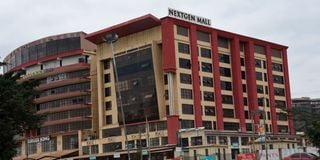Why Nextgen Mall manager has to pay Sh120m to KRA

Nextgen Mall on Mombasa in Nairobi.
Nextgen Mall was formed to manage about 49 units at the commercial centre on Mombasa Road.
Other than managing the mall, the company provides services and facilities for members who purchased business premises and office space from Nextgen Office Suites Ltd.
All was well until August 2022 when the Commissioner of Domestic Taxes carried out an audit at Nextgen Mall Management Company Ltd.
On conclusion of the audit, Kenya Revenue Authority (KRA) proceeded to register the firm for VAT obligations regarding members’ contributions to common areas.
The company was issued with an additional assessment of Sh38.5 million as income tax and Sh81.3 million as VAT.
Nextgen objected to the assessment but KRA issued its objection decision on November 3, 2022, demanding the money.
The company dismissed KRA’s position, saying it is not a trading firm as its main goal is to hold revisionary interest for members.
The services include garbage collection and providing security. Nextgen added that it is also responsible for the collection of proportionate land rent and rates, services charge and others.
KRA took the position that the services listed in the memorandum and articles of association are offered to the occupants of the mall and are thus taxable.
Public limited company
Nextgen Mall Management submitted that though registered as a public limited company, it is not meant for trading, adding that it is a members’ association.
According to the company, KRA did not take into account the fact that members’ contributions towards common areas are determined at annual general meetings.
The firm added that non-members do not make payment for the services and therefore, the amount cannot be treated as income.
The company told the Tax Appeals Tribunal that it was a mistake for the commissioner to treat members’ contributions towards costs incurred on common areas as income.
However, KRA held that the company charges fees for its business in the real estate management and should pay tax.
According to the Commissioner for Domestic Taxes, the money received from members for costs incurred in common areas is payment for services.
The taxman maintained that the company did not prove that its managerial services are exempted supply of services under the Value Added Tax Act.
KRA said the company’s records indicate that it charges Sh35 per square foot for management service.
The said services, according to KRA ought to have been declared for VAT purposes under Section 5 of the Act, necessitating the forceful registration.
The tribunal was informed that KRA relied on the income declared in the company’s tax returns as well as the records it provided to arrive at the gross turnover and the subsequent additional corporate tax and VAT.
The five-member Tax Appeals Tribunal chaired by Mr Eric Nyongesa Wafula said the VAT Act places the burden on the taxpayer to prove that a supply of goods or services is exempt from VAT.
The tribunal said the company was required to prove that the assessment was erroneous.
It said Nextgen needed to provide a plausible explanation as to why it could not provide the documents to disprove the tax claim.
“None of these was done by the appellant. The appellant failed in its duty to prove that the respondent’s assessment was erroneous,” the tribunal said.
It added that the list of documents demanded by the commissioner ought to have been in Nextgen’s custody.





